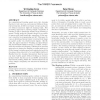88 search results - page 7 / 18 » A Framework for Reinforcement Learning on Real Robots |
EUSFLAT
2001
13 years 8 months ago
2001
The correction of angular misalignment between mating components is a fundamental requirement for their successful assembly. In this paper we present how a learning agent based on...
ICML
2009
IEEE
14 years 8 months ago
2009
IEEE
The purpose of this paper is three-fold. First, we formalize and study a problem of learning probabilistic concepts in the recently proposed KWIK framework. We give details of an ...
ROBOCUP
2000
Springer
13 years 11 months ago
2000
Springer
Q-learning, a most widely used reinforcement learning method, normally needs well-defined quantized state and action spaces to converge. This makes it difficult to be applied to re...
KCAP
2009
ACM
14 years 2 months ago
2009
ACM
As computational learning agents move into domains that incur real costs (e.g., autonomous driving or financial investment), it will be necessary to learn good policies without n...
ICRA
2010
IEEE
13 years 6 months ago
2010
IEEE
— Reinforcement learning (RL) is one of the most general approaches to learning control. Its applicability to complex motor systems, however, has been largely impossible so far d...

